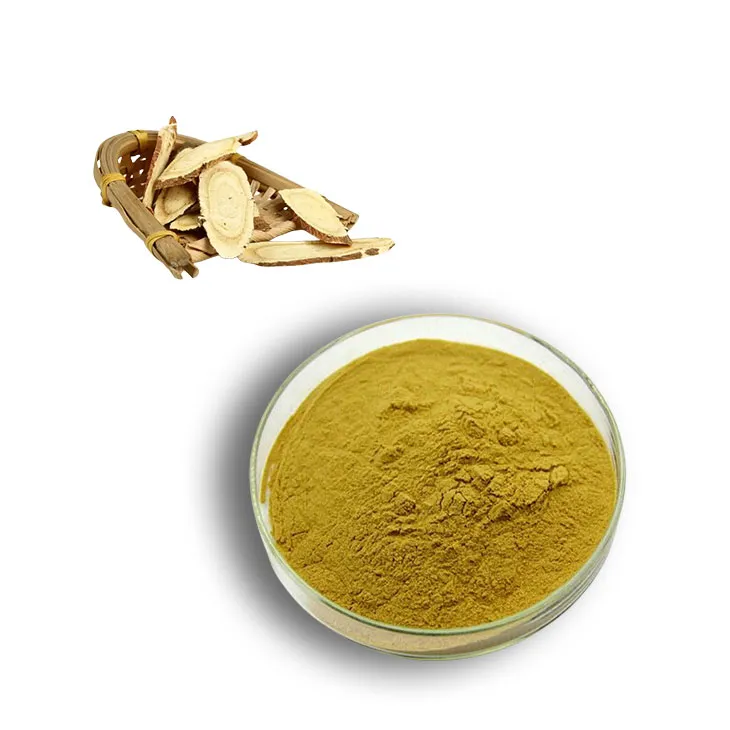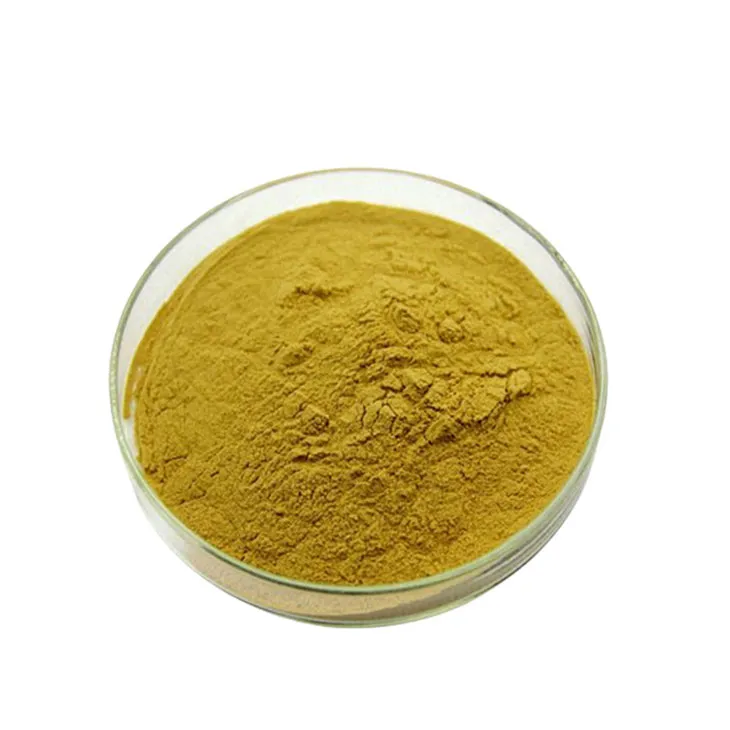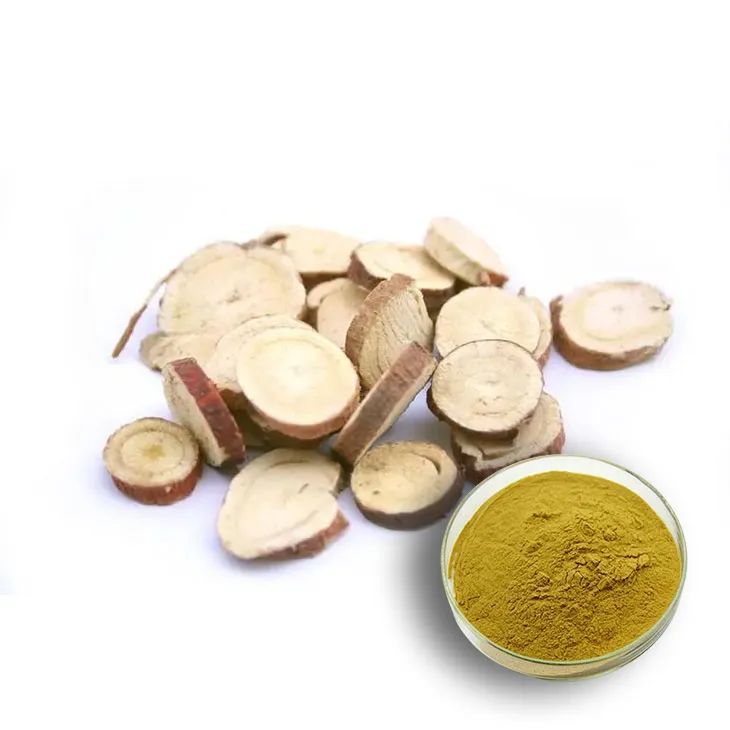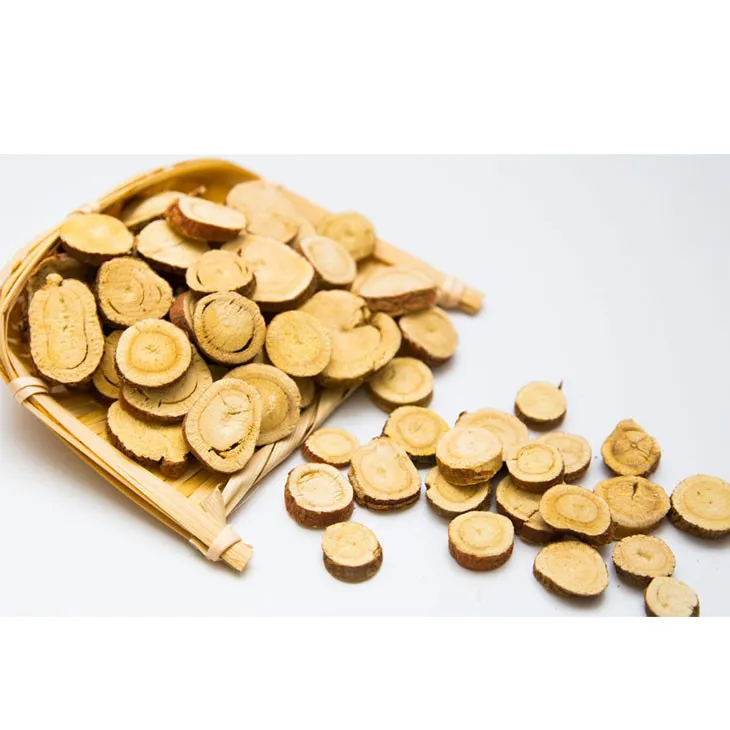- 0086-571-85302990
- sales@greenskybio.com
Licorice Root Extract Powder: What Are Its Benefits and How to Take It?
2024-11-12

Introduction
Licorice Root Extract Powder has been used for centuries in various cultures around the world. Derived from the root of the licorice plant (Glycyrrhiza glabra), this powder is rich in a variety of bioactive compounds that offer a plethora of potential health benefits. In this article, we will explore the numerous benefits of Licorice Root Extract Powder and how it can be consumed in a safe and effective manner.

Benefits of Licorice Root Extract Powder
1. Digestive Health
Licorice root extract powder has long been associated with promoting digestive health. It contains compounds that can help soothe the digestive tract. For example, it has anti - inflammatory properties that can reduce inflammation in the gut. This is beneficial for those suffering from conditions such as gastritis or ulcers.
- It can also help regulate stomach acid production. By maintaining the proper balance of stomach acid, it can prevent issues like acid reflux and indigestion.
- Furthermore, licorice root extract powder may act as a mild laxative, promoting regular bowel movements and preventing constipation.
2. Respiratory Health
In the realm of respiratory health, licorice root extract powder has shown remarkable properties. It has expectorant qualities, which means it can help loosen and expel mucus from the lungs.
- This makes it useful for treating coughs, especially those associated with colds, bronchitis, or other respiratory infections.
- Moreover, its anti - inflammatory effects can also reduce inflammation in the airways, providing relief for those with asthma or other chronic respiratory conditions.
3. Immune System Support
The bioactive compounds in licorice root extract powder play a role in supporting the immune system. It contains antioxidants that can help protect the body's cells from damage caused by free radicals.
- These antioxidants also enhance the function of immune cells, making the body more resistant to infections.
- Some studies suggest that licorice root extract may have antiviral properties, which can be particularly useful during cold and flu seasons.
4. Skin Health
When it comes to skin health, licorice root extract powder offers several advantages. Its anti - inflammatory properties can help soothe skin conditions such as eczema and psoriasis.
- It can also be used to lighten hyperpigmentation. The compounds in licorice root extract can inhibit the production of melanin, which is responsible for dark spots on the skin.
- Furthermore, its antioxidant content helps protect the skin from environmental damage, such as sun exposure and pollution, keeping the skin looking youthful and healthy.
5. Hormonal Balance
Licorice root extract powder may have an impact on hormonal balance. It contains compounds that can interact with the body's endocrine system.
- For women, it may help relieve symptoms of premenstrual syndrome (PMS). Some of the symptoms such as mood swings, bloating, and breast tenderness may be alleviated by the use of licorice root extract powder.
- It can also support adrenal gland function, which is important for overall hormonal regulation in the body.

How to Take Licorice Root Extract Powder
1. As a Tea
One of the most common ways to consume licorice root extract powder is by making it into a tea.
- To make licorice root tea, start by adding about 1 - 2 teaspoons of the powder to a cup of hot water.
- Let it steep for 5 - 10 minutes, depending on the desired strength.
- You can sweeten the tea with a little honey if desired, and then drink it while it is still warm.
2. In Capsule Form
Licorice root extract powder is also available in capsule form.
- When taking it in capsules, it is important to follow the recommended dosage on the product label.
- Typically, the dosage may range from 200 - 500 mg per capsule, and the number of capsules to be taken per day will depend on the specific product and the intended use.
3. As an Ingredient in Food
You can incorporate licorice root extract powder into your diet as an ingredient in various foods.
- It can be added to smoothies for an extra health boost. Simply add a teaspoon of the powder to your favorite smoothie recipe.
- Some people also use it in baking, for example, adding it to cookies or muffins. However, it is important to note that the taste of licorice may be quite strong, so use it sparingly.

Precautions and Considerations
While licorice root extract powder offers many potential benefits, there are also some precautions to be aware of.
- High doses of licorice root extract can cause side effects. Excessive consumption may lead to an increase in blood pressure, as it contains a compound called glycyrrhizin that can affect the body's sodium - potassium balance.
- People with certain medical conditions, such as hypertension, kidney disease, or liver disease, should consult their healthcare provider before using licorice root extract powder.
- Pregnant and breastfeeding women should also avoid using licorice root extract powder, as its safety during pregnancy and lactation has not been fully established.

Conclusion
Licorice root extract powder is a natural supplement with a wide range of potential health benefits. From promoting digestive and respiratory health to supporting the immune system and improving skin health, it has much to offer. However, it is important to consume it in a safe and appropriate manner, taking into account the precautions mentioned above. By understanding its benefits and how to take it correctly, individuals can potentially incorporate licorice root extract powder into their wellness routines and enjoy its positive effects on overall well - being.
FAQ:
What are the main benefits of Licorice Root Extract Powder?
Licorice root extract powder has several potential benefits. It may have anti - inflammatory properties, which can help with various inflammatory conditions in the body. It is also believed to soothe the digestive system, potentially alleviating issues like indigestion and stomach ulcers. Additionally, it may have antioxidant effects, which can contribute to fighting free radicals in the body and promoting overall health.
Is it safe to take Licorice Root Extract Powder?
When taken in moderation, licorice root extract powder is generally considered safe for most people. However, excessive consumption can lead to some side effects. High amounts of licorice can cause an increase in blood pressure, as well as disrupt the body's electrolyte balance. Pregnant women and people with certain medical conditions, such as hypertension or kidney problems, should consult a doctor before taking it.
How can one take Licorice Root Extract Powder?
It can be taken in several ways. One common method is to mix it into a beverage like tea or a smoothie. You can also add it to food, for example, sprinkling it on oatmeal or into a soup. Another option is to take it in capsule form, following the recommended dosage instructions on the product label.
What are the traditional uses of Licorice Root Extract Powder?
Traditionally, licorice root has been used in herbal medicine for centuries. It was often used to treat coughs and sore throats, as it has a soothing effect on the mucous membranes. It was also used to relieve stress and anxiety in some traditional medicine practices.
Can Licorice Root Extract Powder help with skin health?
There is some evidence to suggest that it may have benefits for skin health. Its antioxidant properties may help protect the skin from environmental damage. Additionally, it may have anti - inflammatory effects that could potentially be beneficial for skin conditions like eczema or psoriasis, although more research is needed in this area.
Related literature
- The Health Benefits of Licorice Root Extract"
- "Licorice Root Extract: Traditional and Modern Applications"
- "A Review of the Safety and Efficacy of Licorice Root in Herbal Medicine"
- ▶ Hesperidin
- ▶ citrus bioflavonoids
- ▶ plant extract
- ▶ lycopene
- ▶ Diosmin
- ▶ Grape seed extract
- ▶ Sea buckthorn Juice Powder
- ▶ Beetroot powder
- ▶ Hops Extract
- ▶ Artichoke Extract
- ▶ Reishi mushroom extract
- ▶ Astaxanthin
- ▶ Green Tea Extract
- ▶ Curcumin Extract
- ▶ Horse Chestnut Extract
- ▶ Other Problems
- ▶ Boswellia Serrata Extract
- ▶ Resveratrol Extract
- ▶ Marigold Extract
- ▶ Grape Leaf Extract
- ▶ blog3
- ▶ Aminolevulinic acid
- ▶ Cranberry Extract
- ▶ Red Yeast Rice
- ▶ Red Wine Extract
-
Grapefruit Seed Extract Powder
2024-11-12
-
Medicinal Marshmallow Extract
2024-11-12
-
Berberis aristata Extract
2024-11-12
-
Cranberry Extract
2024-11-12
-
Yohimbine Bark Extract
2024-11-12
-
Europen Bilberry Extract
2024-11-12
-
Jujube Extract
2024-11-12
-
Horse Chestnut Extract
2024-11-12
-
Curcumin
2024-11-12
-
Lemon Extract
2024-11-12





















